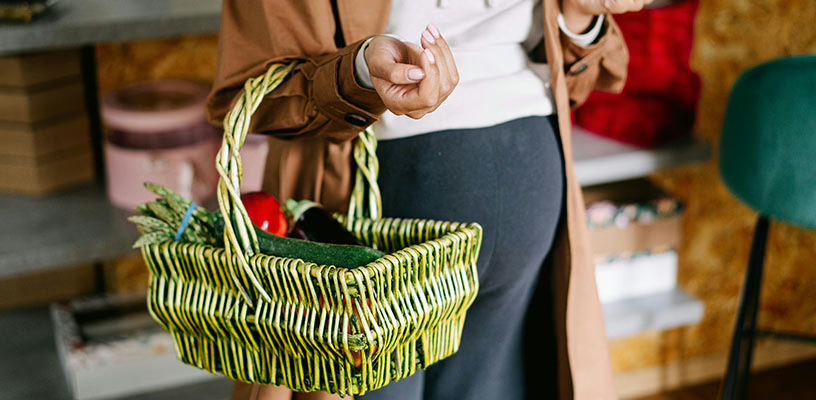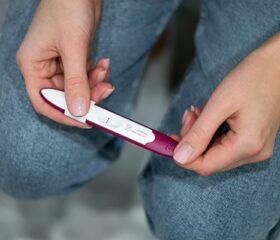8 Ideas for Healthy and Delicious Pregnancy Snacks
Pregnancy—the time when your cravings are just as unpredictable as your mood. Snacks might be the only thing keeping your pregnancy from driving you up a wall, whether you're battling morning sickness, fatigue, or nutritional deficiencies.

Before you start prowling through grocery store aisles with that hunter-gatherer look in your eyes, you should consider what the best nutritional options for you and your baby are.
In this guide, we’ll explain how to keep your snacks healthy and delicious (yes, it’s really possible).
Why are snacks so important during pregnancy?
Snacks are pit stops that help you load up on fuel, boost your mood, and nourish you and your baby. They play an important role in:
Meeting your increased calorie needs
Your body needs a lot of extra energy to keep you going while also supporting your baby’s development—around 340–450 extra calories a day in the second and third trimesters, to be specific. 1
Snacking makes it easier for you to get all the calories you need and support healthy weight gain without needing to choke down bigger portions than you actually want to eat.
Providing essential nutrients
It can be hard to get a balanced meal if you’re experiencing nausea, changes in your taste perception, or food aversions during your pregnancy. However, when you’re pregnant, you can’t afford to just eat comfort food; if you do, you risk letting yourself run low on important nutrients like zinc, folate, calcium, iron, and iodine.
These nutrients keep both you and your baby healthy and may reduce the risk of certain pregnancy complications. 2 Snacks (healthy ones like chopped fruit, not chips) help you fill your nutritional gaps.
Battling nausea and food aversions
If you want to get rid of morning sickness and heartburn, both of which are very common pregnancy symptoms, then eating 5 to 6 smaller portions a day is much better for you than eating a few large meals. 3 4 Here again, snacking is the answer.
Maintaining stable blood sugar levels
Smaller portions also work better for your blood sugar. Think of your blood sugar as a campfire—sprinkling in just enough dry twigs can keep it nice and warm, but dumping a whole can of gasoline is asking for trouble.
You can snack regularly to reduce the risk of your blood sugar levels spiking or crashing. Balance your snacks with protein, healthy fats, and fiber; this also keeps you energized and reduces cravings. 5
Which nutrients are the most important when you’re pregnant?
Everything in life is about balance—even when you’re carrying around that extra baby weight. Your snack stash should include a combination of different nutrients:
- Protein: When you’re pregnant, your body needs some extra protein to give you energy, grow your placenta, and develop your baby’s organs. 6 You can add protein-rich foods, like eggs and tofu, to your pregnancy diet to meet your daily needs.
- Healthy fats: Yes, there’s such a thing. “Good” fats can give you an energy boost, satisfy your hunger, and keep your mind sharp if you’re feeling especially forgetful (this is known as “momnesia” or pregnancy brain, which can start as early as the first trimester). Good sources include avocados, walnuts, and salmon. 7
- Complex carbohydrates: Simple carbohydrates, like French fries, soda, and candy, can make your blood sugar levels spike, which is especially dangerous if you have gestational diabetes. For more filling, healthier options, choose complex carbohydrates like oats and brown or wild rice. 8
- Fiber: Getting enough fiber in your diet is important to help you feel full after meals, regulate your blood sugar levels, and avoid constipation. 9
8 smart and satisfying snack ideas
Knowing what’s healthy is all well and good, but let’s explore how to make your snacks tasty, too.
5 easy and portable dry snacks
If you’re looking for snacks to take on the go, you have plenty of options.
1. Trail mix
This is the Swiss Army knife of snacks. From this mix of nuts, seeds, and dried fruit, you can get the perfect mix of sour, sweet, and salty tastes while loading up on protein, healthy fats, and fiber. Sprinkle in some dark chocolate chips for a little extra pizzazz, as long as you don’t go overboard.
2. Granola bars
Granola boxes are close cousins to trail mix, but they’re shaped and packaged more conveniently and are a good source of whole grains, fruit, and nuts. They’re also a decent pregnancy breakfast option if you’re not particularly hungry and are in a hurry. If you’re buying instead of making, you’ll need to check the labeling for added sugars.
3. Whole wheat pretzels
Don’t want to feel guilty about eating salty, crunchy snacks? You can try this alternative that lets you stock up on whole grains while still scratching that junk food itch.
4. Fruity nut butter packets
If you like nut butter packets made from peanuts, almonds, or cashews, you’ll enjoy pairing them with bananas and apples even more. This is a good way to sneak in some extra protein and healthy fats.
5. Air-popped popcorn
You can skip the oil and pop those kernels right into the microwave or air fryer for a fiber-rich whole-grain snack. For extra flavor, season them with garlic powder, cinnamon, or whatever other spices you like.
3 nutrient-rich meal substitutes
Sometimes, you’re just not going to want to bother preparing a full meal. If you need something quick and easy that can still shush those hunger pangs, try these:
1. Plain yogurt with fruit
If your taste buds are shriveling up at the thought of plain yogurt with no sweeteners, don’t worry. Honey is usually safe to eat when you’re pregnant, so you can drizzle a little bit in if you really need it.
You can also avoid added sugars and jazz up this snack by mixing in your favorite fruits. However, washing them first is especially important during your pregnancy for a variety of reasons.
For example, while pregnant women can eat grapes and similar fruits, they’re known for having have high levels of pesticides, which may cause harm to your baby if you don’t give them a good soaking first.
2. Edamame
It’s as fun to say as it is to eat. You can pop open this soybean pod for protein, fiber, iron, folate, and magnesium and sprinkle it with salt, oregano, and sesame seeds for extra flavor.
3. Hummus and whole wheat crackers
If you want a simple combo of protein, healthy fats, and complex carbohydrates, look no further. You can elevate this snack by adding veggies for extra nutrients, too.
Bedtime snacks for a good night’s rest
Many pregnant women try to avoid eating before bed to combat heartburn, but sometimes, that’s easier said than done. That’s perfectly okay.
Bland, starchy foods like crackers, plain bread, toast, and noodles are great options because they’re easily digestible and usually won’t keep you up at night with an upset stomach.
Snacks to avoid during pregnancy
No one’s judging you for needing the occasional pick-me-up when you’re creating life, but there are certain foods you should avoid during pregnancy. Here’s what you should look out for:
Foods that contain listeria
Some foods are hotbeds for listeria, a microbe that can cause miscarriage, stillbirth, and lifelong complications for your baby, like intellectual disabilities and problems with their vision, heart, and kidneys.
You should watch out for symptoms of listeria while you’re pregnant, like fever, fatigue, and muscle aches, and avoid eating the following: 10
- Unpasteurized dairy products like raw milk, soft cheese (though you can safely eat pasteurized cheese while pregnant), and unpasteurized ice cream
- Unpasteurized juices
- Hot dogs and cold cuts (deli meats) like pepperoni, spam, sausages, turkey, and chicken breast (though you can still eat deli meats while you’re pregnant if you reheat them to 165ºF first)
- Refrigerated smoked seafood (e.g., smoked salmon)
For similar reasons, you should also avoid undercooked meat and eggs. As you probably already know, you can’t drink any alcohol while you’re pregnant.
Ultra-processed foods
When you’re exhausted and hungry, ultra-processed foods (UPFs) seem like a perfect quick fix. However, these foods are low-nutrient and high-calorie and are often drowned in added sugar. Be careful when you eat:
- Baked goods, like cookies, cakes, and pastries
- Sweets, like candy, chocolate bars, sugary cereals
- Potato chips
- Pizza
- Soda, sweetened tea or coffee drinks, energy drinks, or other sugary drinks
While we’re on the topic of UPFs, watch out for everyone’s favorite: bacon. While pregnant women can eat bacon, it’s not particularly healthy for anyone, so eat it in moderation.
Remember that a poor diet puts you at risk of all kinds of complications, including preterm labor, gestational diabetes, hypertension, and other labor difficulties. 11
Healthy UPF substitutions
The heart wants what it wants—and so does your stomach, apparently. If you’re struggling with unhealthy pregnancy cravings, here are some better alternatives to trick your taste buds.
- Ice cream: If it’s a sweet, smooth treat you’re after, try substituting ice cream with frozen yogurt, smoothies, or sorbets and sherbets.
- Candy: Frozen fruits like strawberries and blueberries have just as many vitamins as their fresher counterparts. 12 You can switch candy out for these to enjoy some guilt-free sweetness.
- Soda: Sometimes, you’ll just miss the fizz. Mix sparkling water with fruit juices like grape and orange to tide you over.
- Chips: Seaweed snacks can mimic that salty, rich flavor that you like. Just be careful. While pregnant women can eat seaweed, the brown varieties can be harmful during pregnancy.
Common myths about foods to avoid during pregnancy
While you should try your best to avoid UPFs (no matter how hard it is), here are a few foods that many people believe are forbidden and actually aren’t:
Coffee
Some people might tell you that any amount of caffeine is a no-no because it’s been shown to cause preterm birth, stillbirth, and low birth weight. 13
Fortunately, the truth is that it’s safe to consume caffeine when you’re pregnant as long as you cap it at 200 mg per day (about one 12-ounce cup of coffee). 14
Seafood
You might have heard that you should avoid all seafood due to the presence of mercury, which could hurt your baby’s development. However, there are plenty of safe options. For instance, pregnant women can eat shrimp, tilapia, and salmon.
The problem mainly lies with undercooked fish and shellfish, which is why you can’t eat sushi with raw fish while you’re pregnant. Raw meat and seafood often carry foodborne pathogens.
Moreover, large predatory fish like shark, swordfish, and bigeye tuna (often used in sushi), often contain dangerous amounts of mercury. 15 Still, many other kinds of seafood are okay to eat, as long as they’re fully cooked.
If you have a question about the risks of certain seafood (or any other types of food!), ask your doctor before eating them.
Pineapple
There’s an old wives’ tale that pineapple can induce labor. 16 The idea is that the bromelain in it, the same chemical that makes your mouth tingle when you eat it, somehow softens up your cervix.
Fortunately or unfortunately, there’s no real evidence for this folk belief, and the general medical consensus is that pregnant women can eat as much pineapple as they want.
Note that this contrasts with papaya. While ripe (yellow) papayas are safe to eat and are a good source of nutrients like folate and choline, unripe (green) papayas can induce labor. That’s because your body might confuse the papain in papaya for prostaglandins that trigger uterine contractions. 17
Tips for smart snacking during pregnancy
Here’s how you can make smarter snacking choices that won’t only keep you healthy, but will also save you time and energy, too.
Go for a combo
A balanced snack with protein, complex carbohydrates, and healthy fats will keep you satisfied for longer. Boiled eggs and peanut butter? Sure! Spaghetti with walnuts? Why not? If your combo nourishes you and your baby, then go for it. Just don’t expect your friends and family to be keen to share.
Stock your kitchen
When you keep a variety of fresh fruit, nuts, dairy, and whole wheat grain food, then you’ll never run out of healthy snacks. If you’re worried about your grocery costs skyrocketing, try to save by buying in bulk, checking for coupons online, and taking advantage of store loyalty programs.
Prep grab-and-go snacks
If you want something fast and convenient, try preparing fruit cups, veggie sticks, homemade oatmeal snack bars, and smoothies in advance. Having them pre-portioned can save you time later when you’re in a hurry.
Listen to your body
It might seem simple enough to say that you should eat when you’re hungry, but it’s surprisingly easy to get too caught up in counting calories to remember to do that.
It’s good to be mindful of what you eat, but bear in mind that your calorie needs will increase throughout your pregnancy—especially in the second and third trimesters. As a rule of thumb, it’s fine to eat when you feel hungry, as long as you don’t eat junk food.
Don’t deprive yourself
In a similar vein, if you’re having strong cravings, it’s okay to indulge—in moderation. Having a cheat meal every once in a while doesn’t hurt. Often, trying to replace that craving with something else will lead to eating more later on to compensate anyway. 18
Final thoughts
You don’t have to suffer through the same old boring options just to stay healthy. Treat yourself, your baby, and your taste buds to delicious, nutritious food, and you’ll power through your pregnancy one bite at a time.
Article Sources
- Office of Disease Prevention and Health Promotion. "Eat Healthy During Pregnancy: Quick Tips" Retrieved April 29, 2025.
- UNICEF. "Maternal nutrition" Retrieved April 29, 2025.
- Hospital for Special Surgery. "Pregnancy Nutrition: What to Know Before Conceiving and During Pregnancy" Retrieved April 29, 2025.
- Intermountain Health. "Pregnancy Heartburn? 7 Ways to Get Relief" Retrieved April 29, 2025.
- Johns Hopkins Medicine. "5 Snack Foods to Eat While Pregnant" Retrieved April 29, 2025.
- Institute of Medicine (US) Committee on Nutritional Status During Pregnancy and Lactation. "Nutrition During Pregnancy: Part I Weight Gain: Part II Nutrient Supplements" Retrieved April 29, 2025.
- HelpGuide.org. "Choosing Healthy Fats" Retrieved April 29, 2025.
- MedlinePlus. "Gestational diabetes diet" Retrieved April 29, 2025.
- U.S. Centers for Disease Control and Prevention. "Fiber: The Carb That Helps You Manage Diabetes" Retrieved April 29, 2025.
- American College of Obstetricians and Gynecologists. "Listeria and Pregnancy" Retrieved April 29, 2025.
- The University of Alabama at Birmingham. "Prenatal nutrition: How diet impacts maternal outcomes" Retrieved April 29, 2025.
- CNN. "Why frozen fruit and veggies may be better for you than fresh" Retrieved April 29, 2025.
- World Health Organization. "e-Library of Evidence for Nutrition Actions (eLENA)" Retrieved April 29, 2025.
- Penn Medicine News. "Moderate Amounts of Caffeine Not Linked to Maternal Health Risks" Retrieved April 29, 2025.
- Expecting Health. "Eating Seafood During Pregnancy" Retrieved April 29, 2025.
- McGill University. "Why Does Pineapple Make Your Mouth Tickle?" Retrieved April 29, 2025.
- Healthline. "Is It Safe to Eat Papaya While Pregnant?" Retrieved April 29, 2025.
- Healthline. "12 Effective Ways to Manage Food Cravings" Retrieved April 29, 2025.







